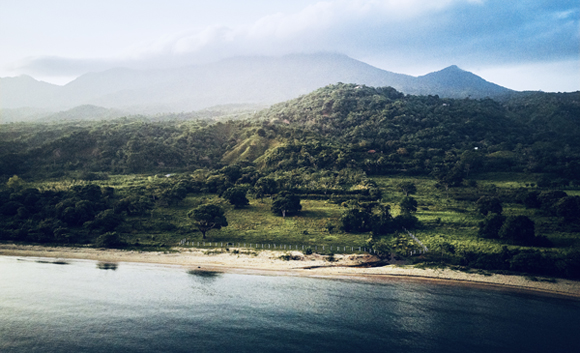Moving to Trujillo, Honduras
Last updated on Jan 15, 2025
Summary: Moving to Trujillo, Honduras: Expats, retirees and digital nomads talk about everything you need to know before moving to Trujillo.

What do I need to know before moving to Trujillo?
When we asked people what advice they would give someone preparing to move to Trujillo, they said:
"Trujillo is a small city located on the northern Caribbean coast of the country, known for its rich history, beautiful beaches, and tropical climate. Spanish is the official language of Honduras, so it would be beneficial to learn some basic Spanish phrases before moving. The cost of living in Trujillo is relatively low compared to many Western countries, but it's important to budget for unexpected expenses. The local currency is the Honduran Lempira, and while credit cards are accepted in some places, it's a good idea to always carry some cash. Trujillo has a tropical climate with high temperatures and humidity throughout the year, so lightweight, breathable clothing is recommended. Healthcare facilities in Trujillo are limited, so it's recommended to have a comprehensive health insurance that covers medical evacuation. Public transportation is available but it's not very reliable, so many expats choose to rent or buy a car. Safety can be a concern in Honduras, so it's important to take precautions such as avoiding certain areas at night, not displaying wealth, and always locking doors and windows. The cuisine in Trujillo is heavily based on seafood, rice, and beans, so be prepared to adjust your diet. Trujillo is in a region prone to natural disasters such as hurricanes and earthquakes, so it's important to have a plan in case of emergencies. The city is home to a mix of cultures, including the indigenous Garifuna people, so it's important to respect local customs and traditions. Internet and mobile coverage can be unreliable, especially in more remote areas, so be prepared for occasional connectivity issues. Finally, it's important to note that while Trujillo offers a laid-back lifestyle, it may lack some of the amenities and conveniences that expats are used to in larger cities," said one expat in Trujillo.
How do I find a place to live in Trujillo?
We asked expats how they chose their neighborhood and found a place to live. They answered:
"Finding a place to live in Trujillo, involves several steps. First, you need to determine your budget and the type of accommodation you're looking for. This could range from a small apartment to a larger house, depending on your needs and financial capacity. Next, you should research the different neighborhoods in Trujillo to understand their characteristics, safety levels, proximity to amenities, and overall vibe. This can be done through online research, speaking with locals, or consulting with real estate agents. Once you have a clear idea of where you'd like to live, you can start searching for available properties. Online property websites are a good starting point. Websites like Encuentra24 and OLX often have listings for properties in Honduras. Social media groups or forums for expats in Honduras can also be helpful. Another effective way to find a place to live is by contacting local real estate agents. They have extensive knowledge of the local market and can help you find a property that fits your needs and budget. Make sure to communicate your preferences clearly to them. Visiting Trujillo in person before making a decision is highly recommended. This allows you to view potential homes, get a feel for the neighborhoods, and possibly negotiate prices. Lastly, once you've found a potential home, ensure you understand the terms of the lease agreement before signing. If necessary, have a lawyer or a trusted local friend review the contract. Remember, finding a place to live can take time, so it's important to be patient and thorough in your search," said one expat who made the move to Trujillo.
What is a typical expat home or apartment like in Trujillo?
"A typical expat home or apartment in Trujillo, is often located in a secure, gated community. These homes are usually modern and spacious, with multiple bedrooms and bathrooms. They often feature open floor plans, with large living areas and fully equipped kitchens. Many homes also have private outdoor spaces, such as balconies or patios, and some even have private pools. The homes are often furnished, with comfortable, contemporary furniture. They are usually equipped with modern amenities, such as air conditioning, high-speed internet, and cable TV. Some homes may also have a maid's quarters or a guest house. The communities where these homes are located often have shared amenities, such as a community pool, fitness center, or playground. Despite being modern and comfortable, these homes often incorporate local architectural styles and materials, giving them a unique, local charm," commented one expat who made the move to Trujillo.
What is the average cost of housing in Trujillo?
If you are thinking about moving to Trujillo, cost of living in probably a key consideration. Expats commented about the cost of housing:
"The average cost of housing in Trujillo can vary greatly depending on the location and size of the property. However, generally, it is considered to be relatively affordable compared to many other locations. For a modest house in the city center, one might expect to pay a few hundred dollars per month in rent, while purchasing a home could cost a few tens of thousands of dollars. Luxury properties or beachfront homes, on the other hand, can cost significantly more," said one expat in Trujillo.
Should I buy or rent a home in Trujillo?
If you have not spent a lot of time in Trujillo, you should rent before even thinking about buying. We asked expats there about the buy vs. rent decision:
"The decision to buy or rent a home in Trujillo, largely depends on your personal circumstances, financial situation, and long-term plans. If you plan to stay in Trujillo for a long period, buying a home could be a good investment. Owning a property allows you to build equity over time and could provide a sense of stability and permanence. However, buying a home also comes with significant upfront costs, including a down payment, closing costs, and potential renovation expenses. It also requires a long-term financial commitment and may limit your flexibility to move. On the other hand, renting a home in Trujillo could be a more suitable option if you're not planning to stay long-term or if you prefer not to have the financial responsibility of owning a home. Renting can offer more flexibility, as it's easier to move if your circumstances change. It also means you won't have to worry about maintenance costs or property taxes, which are typically the landlord's responsibility. However, renting doesn't allow you to build equity and may not offer the same level of stability as owning a home. Rent prices can also increase over time. Before making a decision, it's important to thoroughly research the local real estate market, consider your financial situation, and consult with a real estate professional or financial advisor," explained one expat living in Trujillo, Honduras.
What should I pack when moving to Trujillo?
We asked people living in Trujillo to list three things they wish they had brought and three they wish they had left behind. They responded:
"When moving to Trujillo, you should pack lightweight clothing due to the tropical climate, including shorts, t-shirts, and sandals. Don't forget a swimsuit for the beach and a hat to protect yourself from the sun. Also, pack some light rain gear as the area can experience heavy rainfall, especially during the rainy season. Bring along a good pair of walking shoes or hiking boots if you plan on exploring the local nature reserves or historical sites. It's also a good idea to pack a reusable water bottle to stay hydrated, and a travel first aid kit for any minor injuries or illnesses. Remember to pack all necessary toiletries, including sunscreen and insect repellent, as these items may be more expensive or difficult to find in Honduras. If you take prescription medication, bring enough to last for your entire stay, as it may not be available in Trujillo. Pack a Spanish-English dictionary or phrasebook, as English is not widely spoken in Trujillo. Don't forget to bring all necessary travel documents, including your passport, driver's license, and any necessary visas or permits. Lastly, pack a power adapter for your electronics, as the electrical outlets in Honduras may be different from those in your home country," said one expat who made the move to Trujillo.
 AGS Worldwide Movers
AGS Worldwide MoversGet Quote
Relocating abroad soon? Make your move with AGS! AGS Worldwide Movers is a leader in the international moving industry. Our experience and expertise allows us to guarantee our clients the best quality moving services.
 AGS Worldwide Movers
AGS Worldwide MoversRelocating abroad soon? Make your move with AGS! AGS Worldwide Movers is a leader in the international moving industry. Our experience and expertise allows us to guarantee our clients the best quality moving services.
Get Quote
What cultural faux pas should I try to avoid making in Trujillo?
We asked people in Trujillo if they could share any humorous cultural blunders they commited. For new expats, keep in mind that these incidents are an inevitable part of expat life. Learning to laugh about them is the key!:
"When visiting Trujillo, it's important to respect local customs and traditions to avoid any cultural faux pas. Firstly, avoid discussing sensitive topics such as politics, crime, and poverty. These subjects can be seen as disrespectful and intrusive. Secondly, punctuality is not highly valued in Honduras, but as a foreigner, you should still strive to be on time for appointments or meetings. Thirdly, it's considered rude to point with your fingers in public. Instead, use your whole hand to gesture towards something. Fourthly, avoid wearing revealing clothing, especially in religious or traditional settings. Hondurans tend to dress modestly, and showing too much skin can be seen as disrespectful. Fifthly, do not refuse food or drink offered to you, as this can be seen as a rejection of Honduran hospitality. Lastly, avoid making negative comments about the country or its people. Hondurans are proud of their culture and heritage, and any criticism can be taken personally," remarked one expat in Trujillo, Honduras.
About the Author
 Joshua Wood, LPC joined Expat Exchange in 2000 and serves as one of its Co-Presidents. He is also one of the Founders of Digital Nomad Exchange. Prior to Expat Exchange, Joshua worked for NBC Cable (MSNBC and CNBC
Primetime). Joshua has a BA from Syracuse and a Master's in Clinical and Counseling Psychology from Fairleigh Dickinson University. Mr. Wood is also a licensed counselor and psychotherapist.
Joshua Wood, LPC joined Expat Exchange in 2000 and serves as one of its Co-Presidents. He is also one of the Founders of Digital Nomad Exchange. Prior to Expat Exchange, Joshua worked for NBC Cable (MSNBC and CNBC
Primetime). Joshua has a BA from Syracuse and a Master's in Clinical and Counseling Psychology from Fairleigh Dickinson University. Mr. Wood is also a licensed counselor and psychotherapist.
Some of Joshua's articles include Pros and Cons of Living in Portugal, 10 Best Places to Live in Ireland and Pros and Cons of Living in Uruguay. Connect with Joshua on LinkedIn.
Additional Information:
- Expat Guide to Trujillo
- 7 Tips for Living in Trujillo
- Pros & Cons of Living in Trujillo
- The Essential Guide to Trujillo
- Health Care in Trujillo
- Cost of Living in Trujillo
- Healthcare & Health Insurance in Honduras
- Best Places to Live in Honduras
- Pros & Cons of Living in Honduras
- Chikungunya Disease in Honduras
- Pros and Cons of Living in Honduras 2025
- 2025 Guide to Moving to Honduras

 Trujillo, Honduras
Trujillo, Honduras


